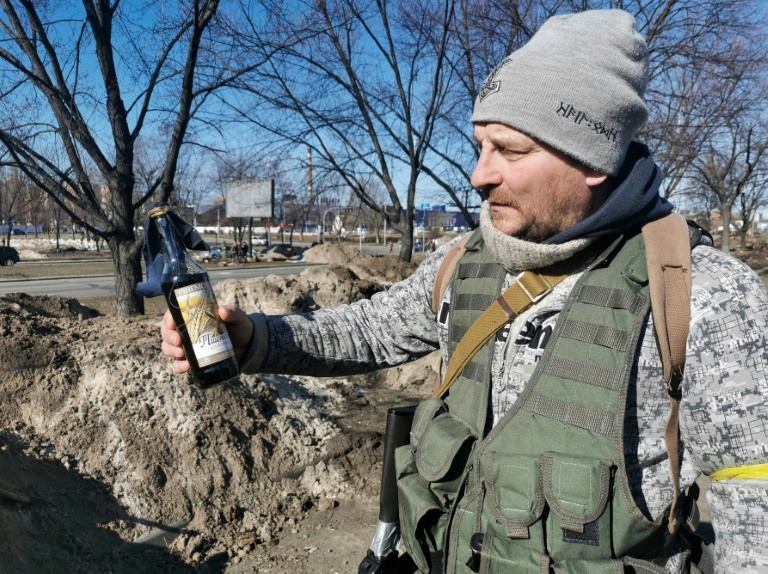The young Ukrainian filmmaker stood over a trench with a rifle while his friends prepared Molotov cocktails. Kyiv’s exhausted but defiant residents are digging in for war.
Three volunteer fighters in olive fatigues worked up a sweat a few steps away, positioning a piece of artillery onto a patch of grass separating two lanes of a big city road.
Electronic billboards around them flashed messages warning invading Russian soldiers that “instead of flowers, you will be greeted with bullets”.
Filmmaker Andriy Ivanyuk took it all in with the confidence of a man yet to experience real combat and said the Russians were about to be taught a lesson they would not forget.
“The Russians know very well that our land is burning under their feet,” Ivanyuk said.
Kyiv woke up from a 36-hour military curfew — enforced by shoot-on-sight orders — on Monday to prepare for the stalled Russian push on the Ukrainian capital.
The Western-backed government’s battled-hardened soldiers are stretched to the limit at the front.
They are fighting Russia’s well-armed forces near the Belarusian border in the north and Kremlin-annexed Crimea in the south.
– ‘Flowers for their grave’ –
Ukraine’s war-scarred east has pitted Kyiv’s troops against Russian-backed insurgent for eight years.
But the historic city of Kyiv is now being defended by its very residents — from artists such as Ivanyuk to bank employee Viktor Rudnichenko.
Both are in their 30s and filled with smiles.
Both were living normal lives until Russia stunned the world and attacked Ukraine last Thursday.
And both are brimming with confidence.
“We will greet them with Molotov cocktails and bullets to the head, that’s how we will greet them,” Rudnichenko said.
“The only flowers they might get from us will be for their grave.”
But bravado is intermixed with expressions of exhaustion and dread on Kyiv’s quickly thinning streets.
– Bravado and exhaustion –
Groups of people were lugging their suitcases to the train station moments after the curfew lifted.
There were rumours that the city had organised two more evacuation trains.
Officials were unable to say how many of Kyiv’s original three million residents had already fled.
But a large proportion of those who remained spent hours standing in queues that were forming outside the city’s stores and kiosk in search of bread and cigarettes.
The city itself is gradually gaining the trappings of a conflict zone.
The booms of Grad missiles and mortar fire fell mostly silent while delegations from Moscow and Kyiv met for talks at the Belarus-Ukrainian border on the fifth day of the war.
But this only gave Kyiv’s volunteer forces more time to roll out everything from furniture and tyres and to garbage bins to fortify checkpoints splitting the city into zones.
“Don’t go on the grass,” volunteer Oleksiy Vasylenko shouted at a passers-by as an air raid siren disturbed the still air.
“There could be explosives! We heard the Russian are hiding mines in the grass,” the 27-year-old warned.
– ‘Saboteurs’ –
The air in Kyiv has been poisoned for days with suspicions that covert Russian units are already hiding in the capital and staging attacks.
The city issued a notice to drivers using Kyiv-registered phone numbers on Monday not to use bus lanes on the right hand of the road.
“If you drive in the bus lane you will be a saboteur and dealt with accordingly,” the message from the city warned.
The checkpoints are manned by nervous and occasionally angry men who demand identity papers while pointing their Kalashnikovs at cars.
The pass code for easier passage is “Slava Ukraini” (Glory to Ukraine) — the national salute despised deeply in the Kremlin and traditionally followed with the response: “Geroyam Slava” (Glory to the Heroes).
The day’s new shift of volunteers bused to the trenches frequently exchanged the salute while milling about and preparing battle plans under a clear blue sky.
“There are enough people here to resist,” said veterinarian Yuriy Gibalyuk,
“We will resist, the whole of Ukraine will resist, whether it is Kyiv, Lviv or Donetsk,” the 50-year-old said.










